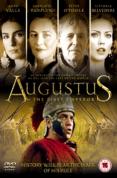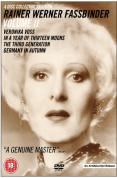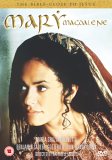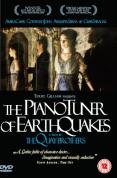![Gathering Storm [2002]](/pictures/1018861.jpg) Gathering Storm | DVD | (17/04/2019)
from £6.99
| Saving you £7.00 (100.14%)
| RRP
Gathering Storm | DVD | (17/04/2019)
from £6.99
| Saving you £7.00 (100.14%)
| RRP The Gathering Storm is a fictionalised portrayal of Winston Churchill and his wife Clementine during their wilderness years of the 1930s. It deservedly won numerous awards, including an Emmy, BAFTA and Golden Globe in recognition of Albert Finney's wonderful central performance. Equally deserving were those for all aspects of the production design: period wardrobe, set dressing and use of location are equally impressive, apparently ensuring that this production has everything going for it in its depiction of pre-War Britain. The snag is that its restriction to TV movie format, a mere 90 minutes, excludes a lot of historical context that ought not to have been left out. Seeing Churchill's adoration of his wife (Vanessa Redgrave) or the family woes troubling Ralph Wigram (Linus Roache) is all very emotionally dramatic, but it uses precious screen time that might have been better devoted to highlighting the political situation abroad, or indeed the monarchy's situation at home. The enterprise smacks a little too much of sentimental contrivance, lionising Churchill in rose-tinted retrospect. True, some attempt is made to acknowledge the personality traits that excluded him both from office and popularity prior to Germany's re-building, but like so much else pertinent to the machinations of anticipating the war, these are glossed over for familial feel-goodery and button-pushing poignancy. This is a film that's easy to admire, but ought not to be mistaken for well-rounded history. On the DVD: The Gathering Storm doesn't look or sound quite as crisp and clear as you'd hope for a recent TV-movie transfer. That's down to some obvious grain in the picture, and the 2.0 surround audio that tends to lose quieter dialogue moments. There are extensive cast and crew biographies that will no doubt help international viewers place the naggingly familiar British faces. There's also the accumulatively enthusiastic commentary from director Richard Loncraine and producer Frank Doelger, which happily points many of them out. --Paul Tonks
![In A Year of 13 Moons (Vintage World Cinema) [Blu-ray]](/pictures/1168003.jpg) In A Year of 13 Moons (Vintage World Cinema) | Blu Ray | (24/03/2025)
from £10.99
| Saving you £N/A (N/A%)
| RRP
In A Year of 13 Moons (Vintage World Cinema) | Blu Ray | (24/03/2025)
from £10.99
| Saving you £N/A (N/A%)
| RRP Made in response to the suicide of Rainer Werner Fassbinder's lover Armin Meier, IN A YEAR OF 13 MOONS is a story of unrequited love, a tortured past and a heart-wrenching search for acceptance. The film traces the final days in the life of Elvira (Volker Spengler), a transgender woman spurned by her former lover, as she reaches out desperately for understanding. Fassbinder crafts both a searing statement on the universal need for love and an elegant exploration of grief in what is arguably his most personal film.
![Goldeneye [1995]](/pictures/1002071.jpg) Goldeneye | DVD | (03/11/2003)
from £6.27
| Saving you £3.72 (59.33%)
| RRP
Goldeneye | DVD | (03/11/2003)
from £6.27
| Saving you £3.72 (59.33%)
| RRP James Bond is back in an adventure which is bigger better and more explosive than ever before. It's packed with incredible stunts glamorous locations beautiful women and fast cars! Bond has a dangerous new enemy to face in his deadly mission. Aided by the Russian underworld his treacherous foe has stolen a top-secret helicopter and the lethal Soviet space weapon GoldenEye with which he plans to obliterate the Western world.
 Berlin Alexanderplatz (Blu-Ray) | Blu Ray | (23/07/2018)
from £68.05
| Saving you £N/A (N/A%)
| RRP
Berlin Alexanderplatz (Blu-Ray) | Blu Ray | (23/07/2018)
from £68.05
| Saving you £N/A (N/A%)
| RRP Franz Biberkopf is an unforgettable man: good-natured, soft, tender, but also hard, violent and brutal. Released from prison following a four-year sentence for the manslaughter of his girlfriend, he plans to make a new start and a decent life for himself. But a chaotic, decadent Berlin of the 20's is not the easiest place for an ex-con to go straight and work is hard to come by. When Franz becomes fascinated by Reinhold, a psychotic small-time crook, he is soon drawn back into a world he cannot escape. SPECIAL EDITION FEATURES: Limited edition deluxe box set (2000 copies only) 'Fassbinder: Love Without Demands' - The acclaimed 2015 feature length documentary by Christian Braad Thomsen An appreciation by writer and critic Tony Rayns Berlin Alexanderplatz - A Visual Essay by Daniel Bird A Mega Movie and it's Story' documentary by Juliane Lorenz 'The Restoration' documentary including before and after' The Original Recaps Berlinale 2007 trailer 60 page perfect bound booklet featuring new essay by Cahiers Du Cinema's Stephane du Mesnildot and archive material by Wim Wenders, Thomas Elsasser and Christian Braad Thomsen
![World On A Wire [DVD] [1973]](/pictures/1100198.jpg) World On A Wire | DVD | (17/05/2010)
from £9.99
| Saving you £10.00 (100.10%)
| RRP
World On A Wire | DVD | (17/05/2010)
from £9.99
| Saving you £10.00 (100.10%)
| RRP Simulacron 1 is a highly advanced project designed to elevate conventional computer technology to a new level by creating a virtual reality inhabited by computer-generated people or 'identity units'. When the head of the project dies mysteriously after showing signs of mental disturbance Dr Stiller becomes his successor. However Stiller also begins to behave bizarrely. He speaks of people disappearing whom no one else knows belives someone is trying to murder him and has nausea attacks. As he begins to probe deeper into Simulacron the line between the real and virtual world becomes increasingly blurred and his own existence is questioned. Rainer Werner Fassbinder's 2 part TV production is a science-fiction classic that explores the notion of a computer-generated other world pre-dating The Matrix by 26 years. Since its original broadcast in 1973 it has rarely been shown and following increasing demand the Fassbinder Foundation have restored this remarkable film under the artistic direction of the film's highly acclaimed cinematographer Michael Ballhaus.
![James Bond - Goldeneye (Ultimate Edition 2 Disc Set) [1995]](/pictures/1040321.jpg) James Bond - Goldeneye (Ultimate Edition 2 Disc Set) | DVD | (17/07/2006)
from £4.44
| Saving you £12.55 (282.66%)
| RRP
James Bond - Goldeneye (Ultimate Edition 2 Disc Set) | DVD | (17/07/2006)
from £4.44
| Saving you £12.55 (282.66%)
| RRP James Bond is back in an adventure which is bigger better and more explosive than ever before. It's packed with incredible stunts glamorous locations beautiful women and fast cars! Bond has a dangerous new enemy to face in his deadly mission. Aided by the Russian underworld his treacherous foe has stolen a top-secret helicopter and the lethal Soviet space weapon GoldenEye with which he plans to obliterate the Western world. This uncut '15' certificate version of Goldeneye is available on DVD for the very first time!
![Proof Of Life [2001]](/pictures/1020215.jpg) Proof Of Life | DVD | (27/08/2001)
from £8.24
| Saving you £5.75 (69.78%)
| RRP
Proof Of Life | DVD | (27/08/2001)
from £8.24
| Saving you £5.75 (69.78%)
| RRP Russell Crowe stars as Terry Thorne, a K&R (kidnap and rescue) expert called in by the wife of an American engineer (played by Meg Ryan) when her husband is kidnapped in South America.
![Asterix And Obelix Take On Caesar (1999) [2000]](/pictures/1019083.jpg) Asterix And Obelix Take On Caesar (1999) | DVD | (30/06/2003)
from £4.99
| Saving you £1.00 (20.04%)
| RRP
Asterix And Obelix Take On Caesar (1999) | DVD | (30/06/2003)
from £4.99
| Saving you £1.00 (20.04%)
| RRP 'Asterix and Obelix Take On Caesar' is France's second most successful film of all time and stars internationally renowned actor Gerard Depardieu as Gaulish warrior Obelix alongside Oscar winning Roberto Benigni as the wicked Detritus. Journey back 2000 years as Ancient France is on the brink of complete Roman invasion well almost complete... except for one small village of indomitable Gauls that still holds out against the invaders. It is here that Asterix and his friends are con
![Institute Benjamenta [Blu-ray] [1995]](/pictures/1096544.jpg) Institute Benjamenta | Blu Ray | (24/05/2010)
from £18.75
| Saving you £6.24 (33.28%)
| RRP
Institute Benjamenta | Blu Ray | (24/05/2010)
from £18.75
| Saving you £6.24 (33.28%)
| RRP Inspired by the writings of the Swiss novelist Robert Walser Institute Benjamenta is the first live-action feature from the acclaimed surrealist animators the Quay Brothers. Jakob (Mark Rylance) enrols into the Benjamenta Institute a dilapidated boarding school for the training of servants. He then tries to unravel the hidden mysteries of the school his fellow pupils and Frau and Herr Benjamenta the siblings who run it. A fascinating symphony of light and shade constructed on the prevailing Quay themes of death decay and nothingness.
![The Rainer Werner Fassbinder Collection Vol. 2 [Limited Edition] [Blu-ray]](/pictures/1156925.jpg) The Rainer Werner Fassbinder Collection Vol. 2 | Blu Ray | (06/12/2021)
from £49.99
| Saving you £N/A (N/A%)
| RRP
The Rainer Werner Fassbinder Collection Vol. 2 | Blu Ray | (06/12/2021)
from £49.99
| Saving you £N/A (N/A%)
| RRP Rainer Werner Fassbinder, the enfant terrible of the New German Cinema, wrote, directed, produced and starred in over 40 films in his short but prolific life, before passing away of a drugs overdose in 1982 aged just 37. Rainer Werner Fassbinder vol. 2 brings together a collection of his key works from the mid-section of his career in high definition digital restorations prepared by the Rainer Werner Fassbinder Foundation. Among Fassbinder's best-loved works, Fear Eats the Soul sees the director paying homage to the classic melodramas of Douglas Sirk in its poignant portrayal of a relationship between a widowed cleaning lady in her sixties and a Moroccan immigrant in his thirties that causes an outrage with her family, friends and neighbours. Fassbinder's long-gestating adaptation of Theodor Fontane's classic German novel Effi Briest, his most expensive production to date as well as one of his most ambitious, tells the tale of a seventeen-year-old girl who is married off by her parents to a wealthy Baron more than twice her age. Fassbinder himself plays the protagonist of Fox and His Friends, a sweet working class soul whose relationship with wealthy industrialist Eugen, he discovers, is based almost wholly on his unexpected lottery win. Chinese Roulette is a tense psychodrama set in an isolated house during a weekend break in which infidelities are revealed and families break down. Fassbinder's international breakthrough film, The Marriage of Maria Braun charts the rise to prosperity of its tenacious and pragmatic central character across the post-war years as she holds out hope for the return of the young soldier she was married to for less than 24-hours before he was dispatched to the Russian front and later reported dead. Limited Edition Contents High definition digital transfers of all films prepared by the Rainer Werner Fassbinder Foundation High Definition (1080p) Blu-rayTM presentations of all films Original uncompressed PCM mono 1.0 sound for all films Optional English subtitles for all films Exclusive 140-page collectors booklet containing archive articles and new writing by Deborah Allison, Geoff Andrew, Margaret Deriaz and Travis Miles. Disc One Fear Eats The Soul Audio commentary by critic and lecturer Mark Freeman My Name is Not Ali, Viola Shafik's 2011 feature-length documentary on the life and death of El Hedi ben Salem, star of Fear Eats the Soul Interview with director of photography Jürgen Jürges Theatrical trailer Disc Two Effi Briest Audio commentary by Ken Moulden Interview with actor Ulli Lommel Interview with director of photography Jürgen Jürges Theatrical trailer Disc Three Fox And His Friends & Chinese Roulette Audio commentary by Hamish Ford on Fox and His Friends Interview with actor Ulli Lommel on Chinese Roulette Original theatrical trailers for both films Disc Four The Marriage Of Maria Braun Life, Love & Celluloid, a 1998 feature-length documentary on Fassbinder, written and directed by his regular editor, Juliane Lorenz Rainer Werner Fassbinder, 1977, a candid 30-minute interview with the director The Fassbinder Family, featurette detailing the actors who worked with Fassbinder time and again throughout his career
 Augustus - the First Emperor | DVD | (22/08/2005)
from £6.54
| Saving you £-4.55 (N/A%)
| RRP
Augustus - the First Emperor | DVD | (22/08/2005)
from £6.54
| Saving you £-4.55 (N/A%)
| RRP As the empire kneeled in defeat one man stood in triumph. In 42 BC Rome is in the middle of a civil war. Together with his friend Agrippa the young Augustus goes to Spain in order to help Julius Caesar in his struggle against the troops of Pompey. Caesar honours his adopted son Augustus with a triumphal entry into Rome and then sends him to Greece together with his friends Agrippa and Maecenas. There Augustus hears the news of Caesar's assassination and he returns to Rome with his friends. Back in Rome he is able to gain both the support of the people and political power. In his struggle with the conspirators against Caesar he finds an ally in Marc Antony. Augustus and Marc Antony are able to defeat the forces of Brutus and Cassius at the battle of Phillipi. But now Augustus has to share his empire with Marc Antony who in the meantime has become the lover of the Egyptian queen Cleopatra. Augustus declares war on both of them and after a successful military campaign he becomes the sole ruler of the Roman Empire. During his rule Rome not only experiences a period of peace and prosperity it is also an age in which both art and culture flourish. His new wife Livia Drusilla becomes his most important political advisor. It is she who discovers that Iullus (the son of Marc Antony and lover of Augustus' daughter Julia) is plotting to murder the emperor...
![The The Marriage Of Maria Braun [1978]](/pictures/1047171.jpg) The The Marriage Of Maria Braun | DVD | (07/08/2006)
from £22.82
| Saving you £-2.83 (N/A%)
| RRP
The The Marriage Of Maria Braun | DVD | (07/08/2006)
from £22.82
| Saving you £-2.83 (N/A%)
| RRP Maria (Hanna Schygulla) marries Hermann Braun in the last days of World War II only for him to disappear in the war. Alone Maria uses her beauty and ambition to prosper in Germany's ""economic miracle"" of the 1950s. Fassbinder's biggest international box-office success and the first part of his 'postwar trilogy' (along with Veronica Voss and Lola) The Marriage of Maria Braun is a heartbreaking study of a woman picking herself up from the ruins of her own life as well as a pointed metaphorical attack on a society determined to forget its past.
 Fassbinder Collection Vol.2 | DVD | (12/11/2007)
from £N/A
| Saving you £N/A (N/A%)
| RRP
Fassbinder Collection Vol.2 | DVD | (12/11/2007)
from £N/A
| Saving you £N/A (N/A%)
| RRP Until his untimely death aged just 36 Rainer Werner Fassbinder blazed a trail through post-war German cinema leaving a prolific and celebrated body of work that continues to inspire shock and challenge audiences and filmmakers. Veronika Voss: Influeneced by Billy Wilder's 'Sunset Boulevard' Fassbinder's savage satire stars Rosel Zech as the eponymous Veronika Voss a washed-up film star who dreams of returning to the glory days of her past. In a Year of Thirteen Moons: Volker Spengler gives an extraordinary performance as the transgendered Elvira a man who has become a woman in a desperate bid to please a former lover. Relaying various episodes from Elvira's life Fassbinder's powerful film is one of his most intensely personal. The Third Generation: One of Fassbinder's most controversial films 'The Third Generation' is a perverse satire about an incompetent gang of bourgeois terrorists who are motivated more by a desire for action than by their weak political convictions. Germany in Autumn: This fascinating portmanteau film also takes as its subject the political unrest wrought in the autumn of 1977 by the terrorist activities of Red Army Faction. Through documentary dramatised vignettes and archival footage Fassbinder and his collaborators examine the events and explore the motivations behind this crisis point in German history.
 The Bible - Mary Magdeline | DVD | (29/11/2010)
from £7.79
| Saving you £0.20 (2.57%)
| RRP
The Bible - Mary Magdeline | DVD | (29/11/2010)
from £7.79
| Saving you £0.20 (2.57%)
| RRP Describe by many as a seductress or witch this magnificent film from 'The Bible' series tells how Mary Magdalene was also a mystic healer and politician. Her life story is graphically depicted as she confronts Herod Herodius the powerful Roman occupiers and eventually a man who is to change her life forever... Mary must choose where her life journey will go as she searches to give love and receive love she finds Jesus.
 The Piano Turner Of Earthquakes | DVD | (26/06/2006)
from £26.98
| Saving you £-6.99 (N/A%)
| RRP
The Piano Turner Of Earthquakes | DVD | (26/06/2006)
from £26.98
| Saving you £-6.99 (N/A%)
| RRP The Piano Tuner Of Earthquakes is the breathtakingly beautiful second film from the brothers Quay. On the eve of her wedding the beautiful opera singer Malvina is mysteriously killed and abducted by the malevolent Dr. Droz. Felisberto an innocent piano tuner is summoned to Droz's secluded villa so that they can service his strange musical automatons. Little by little Felisberto learns of the doctor's plan to stage a ""diabolical opera"" and of Malvina's macabre demise. as h
![The Rainer Werner Fassbinder Collection Vol. 3 [Limited Edition] [Blu-ray]](/pictures/1158988.jpg) The Rainer Werner Fassbinder Collection Vol. 3 | Blu Ray | (13/06/2022)
from £75.57
| Saving you £N/A (N/A%)
| RRP
The Rainer Werner Fassbinder Collection Vol. 3 | Blu Ray | (13/06/2022)
from £75.57
| Saving you £N/A (N/A%)
| RRP Rainer Werner Fassbinder, the enfant terrible of the New German Cinema, wrote, directed, produced and starred in over 40 films in his short but prolific life, before passing away of a drugs overdose in 1982 aged just 37. Rainer Werner Fassbinder vol. 3 brings together a collection of his lesser seen works from various stages in his career, featuring high definition digital restorations prepared by the Rainer Werner Fassbinder Foundation. The American Soldier sees Fassbinder continue to pursue the cinephilic homage to classic Hollywood crime films of his feature debut, Love is Colder than Death, in a tale of a German-American Vietnam vet turned small-time hoodlum who finds himself on the wrong side of the law in Munich, where he grew up. Unseen between its first television broadcast in 1970 and its rediscovery in 2002, The Niklashausen Journey chronicles the journey of a young peasant in the 15th century and his quest to overcome social injustice, in Fassbinder's allegorical critique of the student movement. Gods of the Plague portrays a newly released ex-con as he reacquaints himself with Munich's criminal underworld to plan the robbery of a supermarket. In Rio Das Mortes, two feckless young friends, Michel and Günther, embark on a hare-brained scheme to look for lost treasure in Peru, against strong opposition from Michel's fiancée. Mother Kusters Goes to Heaven stars Brigitte Mira (Fear Eats the Soul) as a middle-aged housewife who is roused into revolutionary activity after her husband dies in an industrial accident. Based on a story by Asta Scheib, Fear of Fear features Fassbinder favourite Margit Carstensen (The Bitter Tears of Petra von Kant) as the young mother plagued with feelings of anxiety and depression as she is left to spend her hours alone surrounded by her judgemental in-laws while her husband spends his days at work. Satan's Brew sees Fassbinder foray into riotous comedy, with Kurt Raab starring as a once famous poet stricken with writer's block who inadvertently assumes the persona of the prewar symbolist Stefan George. Product Features High definition digital transfers of The American Soldier, Gods of the Plague, Mother Kusters Goes to Heaven and Satan's Brew prepared by the Rainer Werner Fassbinder Foundation High Definition (1080p) Blu-ray presentations of The American Soldier, Gods of the Plague, Mother Kusters Goes to Heaven and Satan's Brew Original uncompressed PCM mono 1.0 sound for all films Optional English subtitles for all films Exclusive 140-page collectors booklet containing archive articles and new writing by Jonathan Rosenbaum, Eric Rentschler, David Jenkins, Margaret Deriaz and Earl Jackson. DISC ONE The American Soldier & The Niklashausen Journey Audio commentary by critic Tony Rayns on The American Soldier Audio commentary by critic Olaf Möller on The Niklashausen Journey Fassbinder Shoots Film No 8, a 1971 television documentary by Michael Ballhaus and Dieter Buchmann on Rainer Werner Fassbinder filming The American Soldier Man in the Shadow, an exclusive new in-depth interview with Fassbinder's collaborator Michael Fengler Freedom or Death!, an exclusive new interview with Michael König on The Niklashausen Journey DISC TWO Gods of the Plague & Rio Das Mortes Alter Ego: Harry Baer on Rainer Werner Fassbinder, a 40-minute interview with the star of Gods of the Plague Taking Off, an exclusive new interview with Michael König on Rio Das Mortes Original theatrical trailer for Gods of the Plague DISC THREE Mother Kusters Goes to Heaven & Fear of Fear Audio commentary by critic Olaf Möller on Mother Kusters Goes to Heaven Mother Kusters Goes to Heaven alternate ending New interviews with Renate Leiffer, assistant director on Mother Kusters Goes to Heaven and Fear of Fear New interview with writer Asta Scheib on Fear of Fear Play It Again, Rainer! Fassbinder's Musical Obsessions, a new video essay by Margaret Deriaz on the use of music in Fassbinder's films. DISC FOUR Satan's Brew Audio commentary by critic Tony Rayns The Culture Industry Needs Something Like Me: Views of Rainer Werner Fassbinder, a 1976 documentary portrait of the director by Gert Ellinghaus Fassbinder: Love Without Demands, Christian Braad Thomsen's feature-length 2015 documentary portrait of his friend Fassbinder and the people who worked with him. Original theatrical trailer
![Goldeneye [1995]](/pictures/1004600.jpg) Goldeneye | DVD | (04/11/2002)
from £20.98
| Saving you £-0.99 (-5.00%)
| RRP
Goldeneye | DVD | (04/11/2002)
from £20.98
| Saving you £-0.99 (-5.00%)
| RRP Pierce Brosnan assumed the role of James Bond for the first time in Goldeneye, the 17th entry in the series. Brosnan looks a little light on the big screen under any circumstances, and he does take some getting used to as 007. But this busy film keeps him hopping as freelance terrorists from the former Soviet Union get their hands on super-high-tech weapons. The film's challenge is to bring free-spirited Bond up to date in the age of AIDS and in the aftermath of the cold war: director Martin Campbell (The Mask of Zorro) succeeds on both counts with a cheeky hint of irony. The best moment in the film is a chase scene that finds Bond tearing up the streets of Moscow in a tank. But Brosnan's most interesting contributions are reminiscent of the dark streak that occasionally showed up in Sean Connery's Bond. --Tom Keogh
![Frederick Forsyth Presents: Death Has A Bad Reputation [DVD] [1990]](/pictures/1097324.jpg) Frederick Forsyth Presents: Death Has A Bad Reputation | DVD | (28/09/2009)
from £N/A
| Saving you £N/A (N/A%)
| RRP
Frederick Forsyth Presents: Death Has A Bad Reputation | DVD | (28/09/2009)
from £N/A
| Saving you £N/A (N/A%)
| RRP Frederick Forsyth: Death Has A Bad Reputation
![Space Rangers [1993]](/pictures/1029061.jpg) Space Rangers | DVD | (24/07/2004)
from £N/A
| Saving you £N/A (N/A%)
| RRP
Space Rangers | DVD | (24/07/2004)
from £N/A
| Saving you £N/A (N/A%)
| RRP The year is 2104. Explorers have discovered new worlds and new civilisations. They've established remote outposts in the farthest reaches of the galaxy. A few men and women have volunteered to uphold the law on the frontier: the Space Rangers. Much like the pioneers before them who tamed the Wild West the space rangers have left behind their comfortable lives on Earth to seek new challenges and adventures. And just as the settlers made enemies among the Indians they encountered so
![Institute Benjamenta [DVD] [1995]](/pictures/1096543.jpg) Institute Benjamenta | DVD | (09/11/2009)
from £N/A
| Saving you £N/A (N/A%)
| RRP
Institute Benjamenta | DVD | (09/11/2009)
from £N/A
| Saving you £N/A (N/A%)
| RRP Inspired by the writings of the Swiss novelist Robert Walser Institute Benjamenta is the first live-action feature from the acclaimed surrealist animators the Quay Brothers. Jakob (Mark Rylance) enrols into the Benjamenta Institute a dilapidated boarding school for the training of servants. He then tries to unravel the hidden mysteries of the school his fellow pupils and Frau and Herr Benjamenta the siblings who run it. A fascinating symphony of light and shade constructed on the prevailing Quay themes of death decay and nothingness.

Please wait. Loading...
This site uses cookies.
More details in our privacy policy